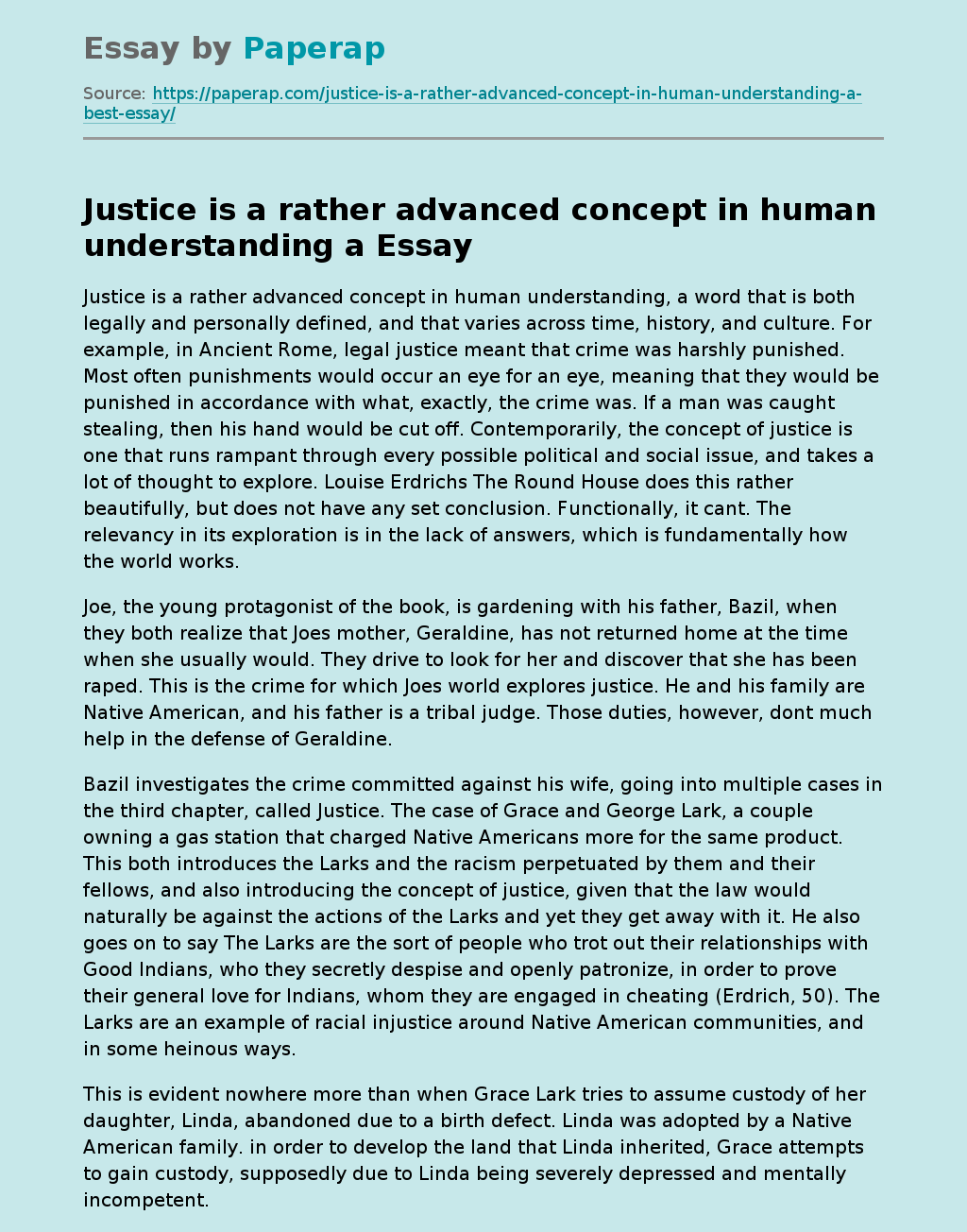"The Round House" by Louise Erdrich
Justice is a rather advanced concept in human understanding, a word that is both legally and personally defined, and that varies across time, history, and culture. For example, in Ancient Rome, legal justice meant that crime was harshly punished. Most often punishments would occur an eye for an eye, meaning that they would be punished in accordance with what, exactly, the crime was.
If a man was caught stealing, then his hand would be cut off. Contemporarily, the concept of justice is one that runs rampant through every possible political and social issue, and takes a lot of thought to explore.
Louise Erdrichs The Round House does this rather beautifully, but does not have any set conclusion. Functionally, it cant. The relevancy in its exploration is in the lack of answers, which is fundamentally how the world works.
Joe, the young protagonist of the book, is gardening with his father, Bazil, when they both realize that Joes mother, Geraldine, has not returned home at the time when she usually would.
They drive to look for her and discover that she has been raped. This is the crime for which Joes world explores justice. He and his family are Native American, and his father is a tribal judge. Those duties, however, dont much help in the defense of Geraldine.
Bazil investigates the crime committed against his wife, going into multiple cases in the third chapter, called Justice. The case of Grace and George Lark, a couple owning a gas station that charged Native Americans more for the same product.
This both introduces the Larks and the racism perpetuated by them and their fellows, and also introducing the concept of justice, given that the law would naturally be against the actions of the Larks and yet they get away with it. He also goes on to say The Larks are the sort of people who trot out their relationships with Good Indians, who they secretly despise and openly patronize, in order to prove their general love for Indians, whom they are engaged in cheating (Erdrich, 50). The Larks are an example of racial injustice around Native American communities, and in some heinous ways.
This is evident nowhere more than when Grace Lark tries to assume custody of her daughter, Linda, abandoned due to a birth defect. Linda was adopted by a Native American family. in order to develop the land that Linda inherited, Grace attempts to gain custody, supposedly due to Linda being severely depressed and mentally incompetent. The case is dismissed with prejudice/
Another exploration of justice in the book takes place with an intersectional perspective, that of Sonya, Joes uncles girlfriend. Initially, she is introduced as a weary, beaten-down stripper, but is revealed to be tough, capable, and often very funny. Joe entrusts her with the secret that he has found forty-thousand dollars in a doll. She drives him around to multiple banks to deposit the money in savings accounts for Joes college.
Later, though, she takes almost all of the money and runs away with it to live on her own, away from Joes uncle. Although this could be perceived as weakness of character or an injustice committed against a person whose life has been turned utterly upside-down, it is also, potentially, justice in and of itself. Especially in consideration to the disenfranchisement of women in this community. It is portrayed as somewhat of a victory, in contrast to the loss that is Geraldines story.
The conclusion of Geraldines story is also an exercise in the exploration of justice in a bit of a different way to the rest of the story, because it is here (more than anywhere else) that the concept of action is introduced. It is revealed about halfway through the book that the identity of Geraldines rapist is Linden Lark, the acknowledged child of the Larks. Joe eventually decides to kill Linden.
In pursuit of this justice, he steals (the rifle he and Cappy use to kill him), lies (to his father about his involvement after the fact), and generally raises the question of action. Or, who must act when the law wont? The case against Linden is shaky, especially since they dont know where the crime took place and cannot prove jurisdiction. Linda hides the rifle, and the boys arent prosecuted for the crime they commit in what they believe is justice against a heinous crime.
A final question of justice is raised when Cappy, who took the final shot against Linden, dies in a car accident. Since Cappy took the shot and killed Linden, does the universe deal one final blow in the fight and kill Cappy? This is supported by the spirituality evident in the rest of the book, and is perhaps a question of justice that should be explored more, in general.
Louise Erdrichs The Round House is a wonderful example of questions asked and answered, and more often, not answered. Joe and his family face injustice after injustice, racism, and loss. Those injustices and the questions resulting are well-explored, from the lack of authority suffered by the Native American community in regards to meting out justice in defence of Geraldine to who must act and what must happen when the law refuses to protect those it is meant to. It is a terrifying and awesome portrayal of justice in all its forms, beautifully written, and frighteningly relevant.
"The Round House" by Louise Erdrich. (2019, Nov 14). Retrieved from https://paperap.com/justice-is-a-rather-advanced-concept-in-human-understanding-a-best-essay/

